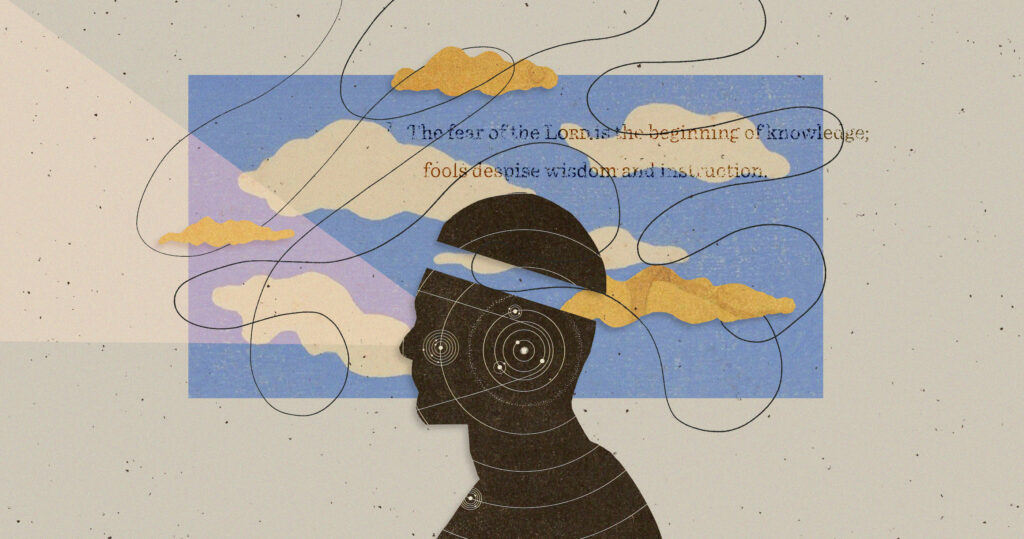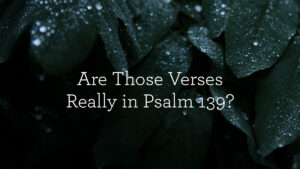The Attraction to Reasoning Has Its Place within the Lifetime of God’s Folks

A Work of Knowledge
What’s knowledge? In biblical perspective, knowledge will not be reducible to the buildup of information, info gathering, or information acquisition, though all three have their place. Knowledge is aware of what to do with knowledge, info, and information for each thought and life. Furthermore, knowledge is based on an perspective:
The concern of the Lord. The concern of the Lord is the start of data;
fools despise knowledge and instruction. (Prov. 1:7)
This reverent perspective acknowledges that God is God and that we’re not God. The distinction is hanging between the sensible individual characterised by one perspective and the idiot by one other. Moreover, knowledge includes an exercise of each acute and astute commentary. The sensible individual is aware of how to concentrate to actuality and take instruction from what’s seen. Proverbs 6:6–11 gives an excellent instance:
Go to the ant,
O sluggard; take into account her methods, and be sensible.
With out having any chief,
officer, or ruler,
she prepares her bread in summer time
and gathers her meals in harvest.
The lesson is then drawn:
How lengthy will you lie there, O sluggard?
When will you come up out of your sleep?
Slightly sleep, a little bit slumber,
a little bit folding of the palms to relaxation,
and poverty will encounter you want a robber,
and need like an armed man.
The sensible individual prospers, the idiot doesn’t. The sensible individual could make a connection between what’s noticed in nature (the ant’s habits in summer time with winter coming) and human life.
In theology, knowledge is reasoning employed because the servant of Scripture and never because the grasp of Scripture. I’ve chosen “reasoning” fairly intentionally. Purpose should not be reified as if it have been a factor separate from us. Purpose doesn’t operate by itself, in a non secular vacuum. Individuals cause. Individuals mount arguments, query or demolish them, and marshal or dismiss proof. And individuals try this both in submission to God or in battle with him.
This quantity within the Brief Research in Systematic Theology sequence explores why theology is essential and the best way to derive good theology from Scripture.
So the place does human reasoning match within the story of knowledge? It was the thinker William James (1842–1910) who outlined philosophy as “the unusually cussed try and suppose clearly.”1 No much less a cussed try is critical for doing theology or reasoning on the whole. But cause can solely ever be norma normata (a dominated norm), as we’ve seen. To position cause above Scripture was the error of the Sadducees. Jesus chided them, “You’re mistaken, as a result of you realize neither the Scriptures nor the ability of God” (Matt. 22:29). Their formal mistake lay of their ignorance of related Scripture. Their materials mistake was their not seeing how Exodus 3:6 affected the resurrection query.
Importantly, there’s a ethical dimension to realizing. Early within the twentieth century, the Scottish theologian P. T. Forsyth captured that dimension in writing: “Logic is rooted in Ethic, for the reality we see relies upon upon the boys we’re.”2 Forsyth should not be misunderstood. He didn’t argue that the reality relies upon upon the sort of ethical brokers we’re. However our skill to acknowledge the reality, see the reality, has an ethical part. Advantage epistemology has its place.3 Jesus taught that it’s the pure in coronary heart who see God (Matt. 5:8). It’s those that do the need of God who know (John 7:17). The truth is, the sensible individual is the virtuous one.
Some might imagine that the autumn has so broken the human thoughts that with out assistance from the Spirit there could be no true thought of something. Some confuse this notion with the noetic results of sin.4 Nevertheless, Jesus thought that the crowds have been in a position to interpret pure phenomena like climate patterns (e.g., Luke 12:54–56). Furthermore, he anticipated Nicodemus as a trainer of Israel to have understood his instructing in regards to the new beginning, though Nicodemus wanted the brand new beginning himself (John 3:1–10). Nicodemus requested, “How can this stuff be?” (John 3:9). Jesus’s reply had a sure sharpness to it: “Are you the trainer of Israel and but you don’t perceive this stuff?” (John 3:10). Even Pilate understood on some stage what Jesus was claiming, although he didn’t consider it: “Pilate additionally wrote an inscription and put it on the cross. It learn, ‘Jesus of Nazareth, the King of the Jews’” (John 19:19). The chief monks additionally understood what Jesus was claiming however needed the inscription nuanced: “Most of the Jews learn this inscription, for the place the place Jesus was crucified was close to the town, and it was written in Aramaic, in Latin, and in Greek. So the chief monks of the Jews mentioned to Pilate, ‘Don’t write, “The King of the Jews,” however quite, “This man mentioned, I’m King of the Jews”’” (John 19:20–21).
Sin causes not a cognitive incapacity however an affective disinclination to belief in God, honor him, or give due to him (Rom. 1:21). As each John Calvin and Jonathan Edwards taught, the Spirit within the new beginning modifications our affections in order that we embrace the issues of God.5 Particularly, this variation in our affections reveals itself in our hospitable reception to the phrase of God (see Acts 17:17; 1 Thess. 2:13; and in distinction, 1 Cor. 2:13–14).6 There may be, due to this fact, an important non secular dimension to realizing God by means of his phrase.
The Attraction to Purpose in Scripture
In so most of the prophetic writings of the Previous Testomony, God is arguing his case towards his individuals, who’ve trodden beneath foot their covenant with him. Even so, God comes with an invite:
Come now, allow us to cause collectively, says the Lord:
although your sins are like scarlet,
they shall be as white as snow,
although they’re crimson like crimson,
they shall turn into like wool. (Isa. 1:1)
The sins in view are delineated within the earlier a part of Isaiah 1: rebel, iniquity, corruption, useless choices, and blood on responsible palms. The prospect of a change of fortune is obtainable:
In case you are prepared and obedient,
you shall eat the great of the land. (Isa. 1:19)
Then logic of the choice is spelled out:
However for those who refuse and insurgent,
you shall be eaten by the sword;
for the mouth of the Lord has spoken. (Isa. 1:20)
In Isaiah 41, God challenges the gods of the nations:
Set forth your case, says the Lord;
deliver your proofs, says the King of Jacob. (Isa. 41:21)
Amongst different issues, the God of Israel can declare what’s to return (Isa. 41:22–23). The gods are impotent on that time (Isa. 41:24). As in a courtroom, the residing God is aware of the best way to argue and mount a case.
Sin causes not a cognitive incapacity however an affective disinclination to belief in God, honor him, or give due to him.
Within the New Testomony we see Jesus in debate with opponents and utilizing well-known types of logical argument. Certainly, thinker Dallas Willard describes Jesus as “the Logician” due to “his use of logic and his apparent powers of logical considering as manifested within the Gospels of the New Testomony.”7 Mark 3 presents an attention-grabbing instance. Jesus’s ministry in Galilee has attracted scribes from Jerusalem to return down and have a look. They can’t deny the miraculous. As a substitute, they provide another rationalization: Jesus’s exorcisms are the work of the satan, not God. Jesus counters:
And he referred to as them to him and mentioned to them in parables, “How can Devil solid out Devil? If a kingdom is split towards itself, that kingdom can not stand. And if a home is split towards itself, that home will be unable to face. And if Devil has risen up towards himself and is split, he can not stand, however is coming to an finish.” (Isa. 1:23–26)
This instance is a traditional reductio advert absurdum (discount to absurdity) argument. If the scribes have been proper, then suppose it by means of: Devil can be within the technique of self-destruction by destroying his personal minions. Jesus presents a way more believable rationalization along with his personal self-reference implied: “However nobody can enter a powerful man’s home and plunder his items, except he first binds the sturdy man. Then certainly he could plunder his home” (Isa. 1:27).
Jesus additionally makes use of argument in a optimistic technique to instruct disciples. So, to encourage prayer, for instance, he teaches within the Sermon on the Mount, “In the event you then, who’re evil, know the best way to give good items to your kids, how far more will your Father who’s in heaven give good issues to those that ask him!” (Matt. 7:11). That is an a fortiori (for the stronger) argument. If the lesser is so, how far more the higher.8
The apostle Paul additionally knew the best way to attraction to cause. He presents the Corinthians a cumulative case for believing in Christ’s resurrection. The Previous Testomony Scriptures predicted resurrection. The risen Christ was seen by the apostles, his brother James, by Paul himself, and a few 5 hundred others, most of whom have been nonetheless alive on the time of Paul’s writing (1 Cor. 15:1–11). However Paul doesn’t go away it at that. He additionally explores the logic of the choice in a sequence of hypothetical syllogisms (1 Cor. 15:12–19). If Christ weren’t risen, then what would observe step after step? The logical type of this a part of his case known as a sorites.
Peter in his first letter makes the purpose extra usually when he requires “at all times being ready to make a protection [apologia, “apology”] to anybody who asks you for a cause for the hope [the gospel] that’s in you.” Christians are to share not solely what they consider but additionally why they consider it when challenged to take action. Defending the religion is Christian apology, and such a protection requires a cause (logos, “phrase,” “cause”).
Within the mild of the cumulative testimony of each the Previous Testomony and the New, the attraction to reasoning has its place within the lifetime of God’s individuals. Biblical faith is a faith of the guts, however in biblical thought the guts contains the thoughts.9
Notes:
- Quoted in Gary E. Kessler, Voices of Knowledge: A Multicultural Philosophy Reader (Belmont, CA: Wadsworth, 1992), 9. Knowledge is very wanted once we attraction to Scripture to deal with points not talked about in Scripture (e.g., abortion). It is very important make a distinction between philosophy as an exercise of cautious thought and philosophy because the doctrines taught by this thinker or that, which can be totally anti-Christian (see, e.g., Daniel C. Dennett, Breaking the Spell: Faith as a Pure Phenomenon). The theologian can tremendously revenue from realizing and utilizing the instruments generated by the exercise of philosophy (e.g., conceptual evaluation). Christians who’re philosophers and theologians who can philosophize have their place within the theological enterprise.
- P. T. Forsyth, The Precept of Authority in Relation to Certainty, Sanctity and Society: An Essay within the Philosophy of Experimental Faith, 2nd ed. (London: Unbiased Press, 1952), 9.
- Certainly, the sensible individual is characterised by advantage, and the silly one is characterised by vice. Additionally it is essential to acknowledge that the possession of data doesn’t assure both advantage or knowledge. Paul wrote to the Corinthians how information can puff one up (1 Cor. 8:1).
- Nous is the Greek phrase for “thoughts.”
- I’ve on my bookshelf a New Testomony examine Bible annotated by Jewish students. I used to be struck, in studying the notes on, e.g., Eph. 2:8–10, that I may have written them myself. The author understands what Paul is asserting about salvation by religion and never works. However believing it’s one other factor. See Amy-Jill Levine and Marc Zvi Brettler, eds., The Jewish Annotated New Testomony (New York: Oxford College Press, 2011), 347.
- Was a change in affection additionally the expertise of Previous Testomony saints? This query raises the problem of whether or not Previous Testomony believers have been born once more, and with it the matter of the continuity or discontinuity between the previous covenant and the brand new covenant. On this query see Graham A. Cole, He Who Offers Life: The Doctrine of the Holy Spirit (Wheaton, IL: Crossway, 2007), 143–45. I argue that certainly Previous Testomony believers have been regenerated.
- Dallas Willard, “Jesus the Logician,” Dallas Willard (web site), http://www.dwillard .org/articles/artview.asp?artID=39, accessed November 29, 2017. Additionally see Juan Valdes, “Jesus: The Grasp of Crucial Considering,” Causes for Hope (web site), https://www.rforh .com/sources/know-it/diving-deeper/jesus-the-master-of-critical-thinking, accessed November 29, 2017.
- The e-book of Hebrews presents an a fortiori argument in Heb. 9:13–14: “For if the blood of goats and bulls, and the sprinkling of defiled individuals with the ashes of a heifer, sanctify for the purification of the flesh, how far more [a fortiori] will the blood of Christ, who by means of the everlasting Spirit supplied himself with out blemish to God, purify our conscience from lifeless works to serve the residing God.”
- For a wonderful dialogue of cause within the service of God, see John Webster, Holiness (Grand Rapids, MI: Eerdmans, 2003), 10–30. I’m grateful to Oren Martin for reminding me of this tremendous work.
This text is customized from Theological Technique: An Introduction by Graham A. Cole.
Associated Articles








